|
|
|
In Umbria 2 things that the whole World admires, or still better 3 : The Trasimeno Lake The Marmore Waterfall and... 'The Perugino'
Umbria Cuore
verde d'Italia
|
In
Umbria 2 cose che tutto
La Cascata delle Marmore
"Il Perugino"
|

Questo è
un sito web corredato da particolari immagini, che dà un prezioso
contributo di informazione
sugli avvenimenti spesso drammatici del
nostro tempo, ma che si rifà anche al passato (vedi
archivio)
e proietta possibili scenari futuri.
This is a
web site accompanied by particular images, that gives a valuable
contribution of information
on the often tragic events of our time, but that
also goes back to the past (see
archive),
and projects possible future scenarios.
PARTICULAR NEWS
AVVENTO 2018 : TEMPO DI PREPARAZIONE E DI ATTESA DEL PROSSIMO NATALE
Ogni riccorrenza dell'anno liturgico - e l'avvento
in modo particolare - dovrebbe essere vissuta nella prospettiva del ritorno
di Gesù
che "tornerà
a giudicare i vivi e i morti, e il cui regno non avrà mai fine"
Parlando dei segni che precederanno il suo
ritorno (già ce ne sono tanti) Gesù ha detto che da ultimo "comparirà
nel cielo il segno del Figlio dell'uomo (una grande Croce) e allora si
batteranno il petto tutte le tribù della terra, e vedranno il Figlio
dell'uomo venire sopra le nubi del cielo con grande potenza e gloria" (Matteo
24:30)
Ad un mese di distanza dal Natale l'associazione IACA ha inaugurato, con una piccola celebrazione, il restauro di una grande Croce lignea - in completo stato di degrado - che fu apposta novant'anni fa all'ingresso della città a conclusione di una missione dei Padri Passionisti.
ADVENT 2018 : TIME FOR PREPARATION AND WAITING FOR THE NEXT CHRISTMAS
Every recurrence of the liturgical year - and the
Advent in a particular way - should be lived in the perspective of Jesus'
return
when "He will come back to judge the
living and the dead, and His kingdom will never end"
Speaking of the signs that will precede his
return (there are already many of them), Jesus said that at the end "the
sign of the Son of Man (a great cross) will appear in heaven, and then all
the tribes of the earth will mourn, and they will see the Son of Man coming
on the clouds of heaven with great power and glory "(Matthew
24:30)
One month before Christmas, at Assisi the IACA association has inaugurated, with a small celebration, the restoration of a large wooden cross - in complete state of decay - that was affixed ninety years ago at the entrance of the city, at the conclusion of a mission of the Passionist Fathers.
* * * * * * * * * * * * * *
21 anni fa (26 Settembre 1997) un forte terremoto sconvolse un'ampia zona tra Umbria e Marche: tantissimi i paesi danneggiati, 10 le vittime, 4 delle quali nella Basilica superiore di San Francesco. I quattro - due erano frati - furono travolti dal crollo della vela soprastante l'uscita della basilica: una tragica assonanza con quanto San Francesco, nel Cantico delle creature, scrisse a proposito di "sora nostra morte corporale da la quale nullu homo vivente pò scappare".
Tanto fu detto a proposito di quel terremoto, e della successiva opera di riparazione della Basilica e recupero dei suoi affreschi Ma pochi cercarono di capire se quel sisma, di cui la Basilica di San Francesco era divenuto l'emblema, avesse un senso che trascendesse la pura dinamica tellurica . Certo la coincidenza della data del terremoto con il giorno della nascita di San Francesco - 26 Settembre, appunto- non poteva passare inosservata . Ma qualcuno ricordò anche di aver sentito la profezia su un terremoto che avrebbe colpito Assisi, scritta da Marcello Ciai due anni prima, in ritiro in un eremo di montagna dopo una grave malattia. In effetti questo "Profeta di Assisi" nel 1995 scrisse -e condivise innanzitutto col suo confessore - alcune profezie, e una riguardava proprio Assisi: un severo monito rivolto dal Signore alla Città Serafica Ne riportiamo uno stralcio:
“Ascolta Assisi, non chiudere le tue orecchie;non rigettare la mia voce. Ascolta terra un tempo benedetta, anche se Francesco e Chiara si presentano dinanzi a me,Io non posso far più nulla per fermare la mia ira. Sì, mi sono stancato di avere pietà, mi sono stancato di sentire predicar pace e misericordia. Guerra, fame e malattie manderò sulla terra, oracolo del Signore.Guai ad Assisi, ad Assisi dove si accampò Francesco e vinse. Come un fantasma dalla polvere parlerà la moltitudine di stranieri che pistano la tua terra. Continuino le tue feste, continuino, tremerà, fenderà la tua terra ... riti su riti, feste su feste, rovine su rovine! Ascolta! No non vuoi udire! Leggi! No non vuoi leggere!I tuoi orecchi sono fatti per altri ascolti, i tuoi occhi per altre letture. Allora su tutta la terra, sfonderò i timpani di chi non ode, caverò gli occhi di chi non vede, annienterò l’intelligenza degli intelligenti. Oracolo del Signore.
Il deserto si trasformerà poi e dunque in giardino. In un libro finalmente leggeranno. L’umiltà udrà, la giustizia vedrà, il beffardo e il buontempone spariranno e nessuno potrà più per un nulla rovinare l’altro. I messaggeri di pace non si strozzeranno e gli araldi li accoglieranno. Il giardino si trasformerà in parco
e il libro in dottrina. Lo Spirito del Signore abbraccerà la terra e i morti allora si ameranno." La profezia la si può leggere per intero nel libro "Il profeta di Assisi" edito dall'associazione IACA, dove oltre alla raccolta delle profezie di questa singolarissima e sofferta figura di vero profeta, sono riportate alcune sue eccezionali esperienze mistiche. Merita di essere qui riportata l'introduzione al testo della profezia di Assisi, intitolata "Ascolta Assisi !":
“Ascolta Assisi!” è rimasta famosa come “la profezia
sul terremoto di Assisi”, che fu predetto due anni prima, con una
sorprendente analogia sul divario di tempo di due anni con cui nel libro di
Amos, il più antico libro profetico della Bibbia, fu profetizzato un
terremoto che segnò la storia di Israele. È una profezia ben severa, quella
su Assisi, di cui viene stigmatizzato il moltiplicarsi di riti e di feste,
mentre gli orecchi del cuore non vogliono ascoltare ciò che Dio dice. I
castighi minacciati (tra cui ”tremerà, fenderà la tua terra”, con
l’eclatante avverarsi nella piazza della Basilica inferiore, squarciata in
due) addirittura non si limitano al terremoto; ma al tempo stesso
l’allargarsi della profezia a “tutta la terra” mostra l’importanza che la
città di San Francesco - che è ormai il santuario più famoso del mondo -
riveste agli occhi di Dio; come se il venir meno, in Assisi, di un vero
spirito di umiltà, preghiera e intercessione abbia tragiche ripercussioni su
tutto il mondo. Il finale veramente glorioso della profezia fa presagire un
nuovo ordine di pace vera, perché conseguente a un vero, umile ascolto della
parola di Dio.
* * * * * * * * * * * * * *

Il grande peccato che accomuna i media di tutto il mondo, è un peccato di omissione: non parlano di Dio!
A margine dell'ultima edizione del Festival Internazionale del Giornalismo a Perugia, il più grande evento giornalistico a livello europeo, il quotidiano La Repubblica scriveva: "Immancabile, anche quest'anno, il predicatore scalzo Massimo Coppo, col suo carico di libricini in cambio di offerte. - Milioni di parole,
in questo Festival, ma nessuno che pronuncia la parola Dio - dice aggrappato al suo bastone".
Ai tantissimi partecipanti al Festival, questo predicatore scalzo ricorda ogni anno che c'è un Dio, Creatore del cielo e della terra, che nel suo amore e nella
sua giustizia interviene - e come! - nella storia di ogni essere umano e del mondo anche se nell'ottica dei media Dio è inesistente, o irrilevante, o comunque opinabile, e quindi non se ne parla.
Massimo cita spesso le provocatorie parole profetiche che si leggono nelle profezie di Marcello Ezechiele Ciai, il "profeta di Assisi", che lo ha portato a riconoscersi nella fede cristiana cattolica, da ex-agnostico e poi "protestante"evangelico qual'era prima.
Nella profezia ricevuta da questo mistico sul terremoto di Assisi due anni prima - nel 1995 - così si esprimeva lo Spirito verso un mondo che non vuol riconoscere il rivelarsi e l'agire di Dio nella storia: "Ascolta! No non vuoi udire! Leggi! No non vuoi leggere! I tuoi orecchi sono fatti per altri ascolti, i tuoi occhi per altre letture. Allora su tutta la terra, sfonderò i timpani di chi non ode, caverò gli occhi di chi non vede,annienterò l’intelligenza degli intelligenti. Oracolo del Signore".The great sin that unites the media of the whole world is a sin of omission: they do not speak about God!
On the sidelines of the last edition of the International Festival of Journalism in Perugia, the largest journalistic event in Europe, the newspaper La Repubblica wrote: Unfailing also this year, the barefoot preacher Massimo Coppo, with his load of little books in exchange for offers. "Millions of words, in this Festival, but no one who utters the word God" he says clinging to his rod.
To the many participants of the Festival, this barefoot preacher remembers every year that there is a God, Creator of heaven and earth, who in his love and justice intervenes - and how! - in the history of every human being and of the world: even if in the perspective of the media, God doesn't exist, or is irrelevant, or questionable anyway, and therefore they don't speak about him.
Massimo often quotes the provocative prophetic words that one can read in the prophecies of Marcello Ezechiele Ciai, the "prophet of Assisi", to whom he owes to have returned into the Catholic Church, after having been formerly agnostic and then evangelical. In the prophecy received by this mystic on the famous earthquake of Assisi two years earlier (in 1995), so the Spirit expressed himself towards a world that does not want to acknowledge how God reveals himself in the human history: "Listen! No, you won't listen! Read! No, you won't read! Your ears are made for other listenings. Your eyes for other readings. Then on the whole earth, I will break the eardrums of those who don't hear, I will gouge out the eyes of those who don't see, I will annihilate the intelligence of the intelligent. Oracle of the Lord".
* * * * * * * * * * * * * *

Ma l'Inferno c'è...
questo è il titolo di un breve ma illuminante trattato,
edito a cura dell' Associazione Iaca,
su un "rovente" argomento più che mai dibattuto in questi giorni.
* * * * * * * * * * * * * *
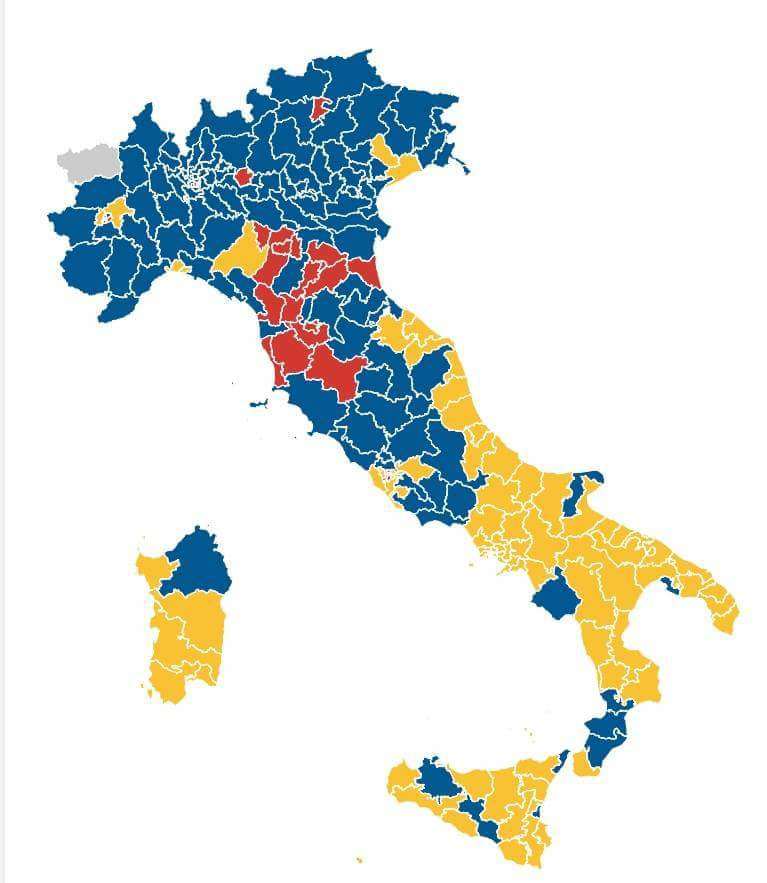
Dopo le elezioni: quali speranze per l'Italia?
Le elezioni politiche sono sempre un motivo di speranza: si spera che poi le
cose vadano meglio, soprattutto in termini di benessere e sicurezza. Ogni
partito ha la sua "ricetta":
programmi più o meno diversi uno dall'altro, ma a ben guardare accomunati da
una gravissima dimenticanza: Dio. Di Dio non se ne parla, come se non
ci fosse o fosse ininfluente
nelle vicende umane (solo Matteo Salvini, il leader della Lega, parlando
alla folla a Milano, a Piazza Duomo, ha fatto riferimento al "Sacro
Vangelo":
e naturalmente c'è chi lo ha deriso o criticato ...)
Più che a sentir parlare di Dio, la gente sembra molto più interessata ad
altri argomenti più ... terreni. "Il popolo due sole cose ansiosamente
desidera" scriveva ai tempi dell'antica Roma il famoso poeta satirico
Giovenale: "pane e giochi circensi" (insomma: mangiare e divertirsi).
Non che le cose siano cambiate di molto, oggi. Ed è la inarrestabile spinta
alla libertà di fare, almeno nel privato, ciò che uno vuole, anche se
contrario alla benefica legge di Dio. Tutto è ammesso e legalizzato: nel
1970 passò la legge sul divorzio, nel '78 fu legalizzato l'aborto ... per
arrivare, nel 2016, al riconoscimento dei matrimoni gay; ed è presto
prevedibile una legge sull'eutanasia. E per qualche voto in più, i partiti
fanno a chi offre di più, assecondando le voglie della maggioranza.
Quale speranza, per un paese che si sta allontanando sempre più dalle sue
radici cristiane? "Quando sono scosse le fondamenta" sta scritto "il
giusto che cosa può fare?" (Salmo 10:3)
Dal patrono d'Italia, San Francesco d'Assisi, un monito per chi sarà
incaricato a governare il nostro paese: "Tutti coloro che
dimenticano il Signore e si allontanano dai comandamenti di lui, sono
maledetti e saranno dimenticati da lui...e quanto più sapienti e potenti
saranno stati in questo mondo, tanto maggiori saranno i tormenti che
dovranno patire nell'inferno" (Lettera ai reggitori dei popoli). E in
una delle profezie del "Profeta di Assisi" (Marcello Ezechiele Ciai: Alla
Città gaudente, 1995) con queste severe parole il Signore ci mette in
guardia da utopistiche attese: "Perché
dite: 'pace, libertà, benessere', quando queste cose non ci sono e non
potranno essere?.... Io
faccio piovere secondo le stagioni; io ho creato la semina e la vendemmia;
ma voi siete solo capaci di ubriacarvi delle vostre idee. I vostri iniqui
pensieri hanno sconvolto tutte le cose belle da me per voi create.
Ed è per questo che sventura e terrore arriveranno su di voi...".
After the elections: what hopes for Italy?
Political elections are always a reason for hoping: people hope that things
will get better, especially in terms of well-being and security. Each party
has its own "recipe":
programs more or less different from each other, but united by a very
serious forgetfulness: God. God is not mentioned, as if He wouldn't
exist or would be irrelevant in
human affairs (only Matteo Salvini, the leader of The League,
speaking to the crowd in Piazza Duomo, at Milan, referred to the "Holy
Gospel":
and of course he was been mocked or criticized by some).
More than wanting to hear about God, people seem much more interested in
other more "worldly" topics ... "People only two things anxiously desire"
the famous satirical poet
Juvenal wrote in ancient Roman times: "bread and circus games" (in
short: eating and having fun). Today things are not so much different. And
no one can stop the trend to be
free to do, at least in the private, whatever one wants, even if contrary to
the beneficial law of God. Everything is admitted and legalized: in 1970 in
Italy the law on divorce passed,
in 78 abortion was legalized... in the end, in 2016, the recognition of gay
marriages; and a law on euthanasia is probably coming soon. And to get some
more votes,
political parties outbid each other in satisfying the wishes of the
majority.
What a hope can be there, for a country that is increasingly moving away
from its Christian roots? "If the foundations are destroyed" one
reads in the Bible "what can the righteous do?"
(Psalm 10: 3). From the Patron Saint of Italy, St. Francis of Assisi, a
warning to those who will be appointed to rule Italy: "All those who
forget the Lord and turn away from his commandments, are cursed and will be
forgotten by him ... and the more wise and powerful they may have been in
this world, the greater the torments they will have to suffer in hell"
(Letter to the rulers of the peoples). And in one of the prophecies of the
"Prophet of Assisi" (Marcello Ezechiele Ciai: To the pleasure seeking
city, 1995) the Lord warns us against utopian expectations with these
severe words: "Why do you say: 'peace, freedom, well-being', when these
things are not here and will not be?.... I make it rain according to the
seasons, I have created the sowing and the harvest, but you are only able to
get drunk on your ideas Your wicked thoughts have upset all the beautiful
things from me you created by me, for you.
Therefore misfortune and terror will come upon you ... "
* * * * * * * * * * * * * *

PAROLA DI DIO!
Nel corso della Santa Messa, terminata la lettura del passo biblico previsto
per quel giorno, il lettore proclama: "Parola di Dio!" E l'assemblea
risponde: "Rendiamo grazie a Dio!" Eh sì, c'è proprio da
ringraziare Iddio che ha voluto garantirci una "lampada per i nostri
passi, che illumini il nostro cammino!" (Salmo 118:105), ispirando
nell'arco di 1500 anni una quarantina di santi, profeti e giusti a
scrivere parola certe di verità, a cominciare dal libro della Genesi per
finire con l'Apocalisse di San Giovanni. E' solo in questo meraviglioso
sacro libro che possiamo scoprire dove stiamo andando:
ognuno di noi, la Chiesa, il mondo. Interrogativo quanto mai attinente
all'inizio di un nuovo anno.
Il problema oggi - e uno dei più seri della Chiesa Cattolica - è che tanti
ministri della Chiesa non credono e non ritengono più la Parola di Dio
quale essa è veramente, ultima e definitiva fonte di autorità.
"Non tagliate rettamente e fermamente la mia parola" recrimina il
Signore nella prima delle profezie di Marcello Ezechiele Ciai (Il Mantello,
1995) "e il popolo va male per mancanza di conoscenza".
Un esempio di drammatica attualità: assistiamo tutti alla crisi epocale
della famiglia. La durata media dei matrimoni in Italia è di circa 17 anni.
Aumentano le separazioni, e aumentano le convivenze
"more uxorio": sono tanti che non presentano più il proprio partner come
"mio marito" o "mia moglie", ma come "il mio compagno" o "la mia compagna"
(una sorta di "SFL", società a fedeltà limitata...).
E cresce una triste nuova categoria di orfani, che il padre o la madre li
hanno sì, ma da qualche altra parte.
Di chi è la colpa? Nella citata profezia del Profeta di Assisi, si legge
ancora: "Guai a voi preti e frati che pascete voi stessi, voi siete i
maggiori responsabili!" Parole dure: ma in fondo sono loro che
dovrebbero insegnare ciò che la Parola di Dio insegna per il bene e la
felicità dei coniugi e delle famiglie. Sta scritto ad esempio (Lettera agli
Efesini 5:24-25): "Le mogli siano soggette ai loro
mariti in tutto. E voi, mariti, amate le vostre mogli, come Cristo ha amato
la Chiesa e ha dato se stesso per lei". Proprio così: sottomissione
delle mogli ai mariti, mariti disposti a dare la loro vita per
amore delle mogli. E' "Parola di Dio!". Ma poiché la sola idea che
una moglie debba essere sottomessa al marito suona raccapricciante
nell'odierno clima iperfemministico, tanti religiosi, anche eminenti
personalità della Chiesa, si sottomettono al diktat della cultura dominante.
Ho letto così - con sgomento - nell'ultima edizione della Bibbia della
Conferenza Episcopale Italiana, a commento (o meglio
a distorsione) di quanto anche l'Apostolo Pietro, primo Papa della Chiesa,
scrive riguardo alle donne coniugate: "Voi mogli, siate sottomesse ai
vostri mariti" (Prima Lettera 3:1), questa nota apposta
a piè di pagina: "La sottomissione delle donne ai mariti rispecchia il
clima culturale del tempo". Come dire: oggi questa sottomissione non
è più dovuta... Ma allora, i passi che ne parlano nel
Nuovo Testamento - ce ne sono altri, oltre ai due sopra citati - sono o non
sono Parola di Dio divinamente ispirata e sempre valida? "Siete veramente
abili nell'eludere il comandamento di Dio!"
rimproverava il Signore Gesù ai Farisei (Marco 7:9); ai quali ricordava: "la
Scrittura non può essere annullata" (Giovanni 10:35). Aderiamo dunque
con totale fiducia alla Sacra Bibbia, come hanno
fatto prima di noi i Santi e i veri credenti di tutti i tempi. Ma attenti a
quanto di umano vi è aggiunto: le introduzioni ai singoli libri, le note di
fondo, la stessa suddivisione in capitoli e versetti non è
ispirata, come lo è invece il testo stesso. Vi possono essere anche cose non
vere, e fuorvianti...
WORD OF GOD!
In the course of the Holy Mass, when the reading of the biblical passage
scheduled for that day is over, the reader proclaims: "Word of
God" And the
assembly responds: "Let us give thanks to God!".
Indeed, we ought really
give thanks to God, who wanted to provide for us a "lamp for our steps,
which enlightens our path!" (Psalm 118: 105), inspiring in the time
frame of 1.500 years about forty saints,
prophets and righteous people to write words of sure truth, beginning with
the book of Genesis to end with the Revelation of St. John. It is only in
this wonderful holy book that we can find out where we
are going: each one of us, the Church, the world. A very relevant question
at the beginning of a new year.
One of the most serious problems of the Catholic Church today is that many
ministers of the Church do not believe in what the Word of God truly is, the
last and definitive source of authority.
"You do not treat correctly and firmly my word" recriminates the Lord
in the first of the prophecies of Marcello Ezechiele Ciai (The Mantle, 1995)
"and people go wrong for lack of knowledge".
An example of dramatic actuality: we all witness the epochal crisis of the
family. The average duration of marriages in Italy is about 17 years.
Separations increase, and more and more couples
live together "more uxorio" without getting married. They no longer present
their partner as "my husband" or "my wife", but as "my companion": a sort of
"limited
liability company"...
And a sad new category of orphans is increasing, orphans who have a father
and a mother, but they have them somewhere else. Whose fault is it? In the
mentioned prophecy of the prophet of Assisi,
one also reads: "Woe to you, you priests and friars who herd
yourselves, you are the main most responsible!". Hard words: but
basically they are those who should teach what the Word of God teaches for
the good and the happiness of couples and families. It is written (Epistle
to the Ephesians 5: 24-25): "As
the church is subject to Christ, so let wives also be subject in everything
to their husbands.
Husbands, love your wives, as Christ loved the church and gave himself up
for her ".
Just so: submission of the wives to their husbands, husbands willing to
give their lives for the love of their wives.
This is "Word of God!" But since the mere idea that a wife should be
subjected to her husband sounds horrifying in today's hyper-feminist
climate, so many religious, even eminent Church personalities,
submit to the diktat of the dominant culture. I even read - with dismay - in
the last edition of the Bible of the Italian Episcopal Conference, a comment
(or better a distortion) on what also the Apostle Peter,
the first Pope of the Church, writes about married women: "You wives, be
submissive to your husbands" (First Letter 3: 1) Here is the footnote:
"The submission of women to husbands reflects the cultural
climate of that time". How to say: today this submission is no longer due
... But now, the passages that talk about it in the New Testament - and
there are some others, in addition to the two mentioned above -
are they or aren't they Word of God, divinely inspired and always
valid? "You are truly skilled in evading God's commandment!" the Lord
Jesus scolded the Pharisees (Mark 7:9), reminding them:
"the Scripture cannot be annulled" (John 10:35). Let's therefore
adhere with total trust to the Holy Bible, as the Saints and the true
believers of all times have done before us. But be careful to what has been
added to it by men: the introductions to the individual books, the
footnotes, the same subdivision into chapters and verses are not inspired,
unlike the text itself.
You might find there things that are not true, and misleading...
* * * * * * * * * * * * * *
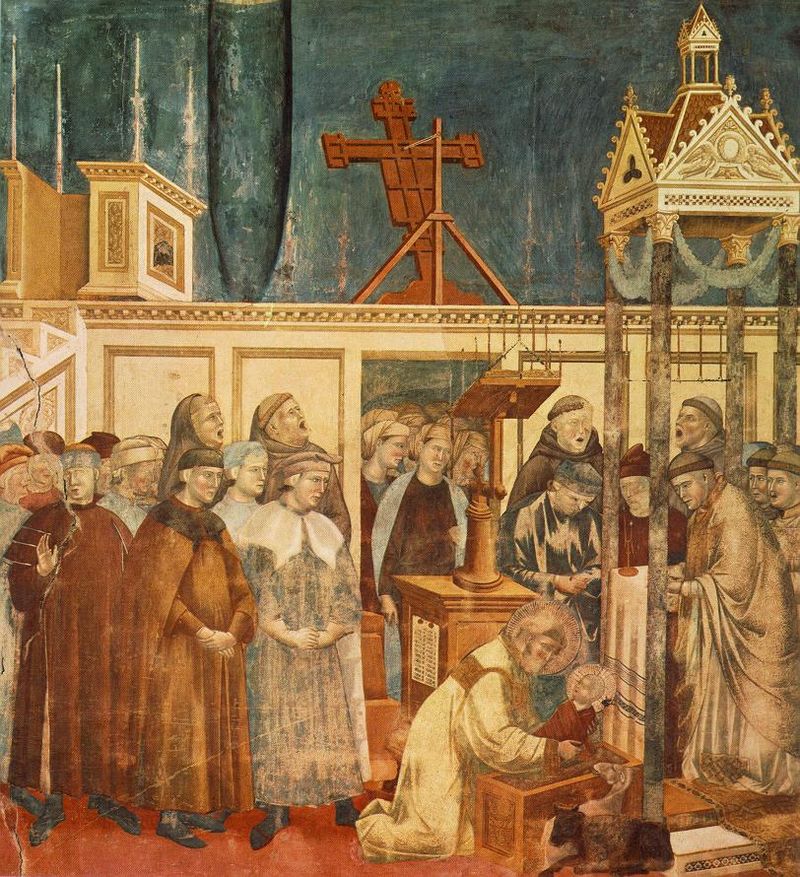
Natale,
tempo di presepi
Fu San Francesco che nel Natale del 1223 allestì a Greccio, nel Reatino, la
prima rappresentazione della Natività , e Assisi dedica ai presepi ampi
spazi a Piazza del Comune,
divenuta in questo periodo natalizio "Piazza dei Presepi".
Ma il primo presepe realizzato dal Santo otto secoli fa, era ben diverso - e
al tempo stesso molto più significativo - dei presepi che siamo abituati a
vedere, anche come
presepi viventi (ce ne sono tre nella zona di Assisi). Gli unici personaggi
"viventi" del presepe di Greccio erano...un bue e un asino! Al posto dei
pastori, c'era la gente del luogo
che arrivava festante nella notte facendo risuonare i boschi di voci e canti
di lode. Non c'erano raffigurazioni di Giuseppe e Maria, e sulla mangiatoia,
dove tradizionalmente appare
adagiato il Bambinello, Francesco volle che si svolgesse il rito solenne
della Messa, in cui la celebrazione eucaristica rende realmente presente
Gesù nel pane e nel vino consacrati.
Un forte messaggio, per chi lo vuol comprendere: anziché soffermarci ad
ammirare l'arte con cui sono realizzati i vari presepi, soppesiamo bene le
parole che disse Gesù alla folla
che lo seguiva dopo la strepitosa moltiplicazione dei pani: "Io sono il
pane vivo disceso dal cielo...Chi mangia la mia carne e beve il mio sangue
ha la vita eterna, e io lo risusciterò
nell'ultimo giorno" (San Giovanni 6 : 51,54). Se anche noi,
come in quel Natale a Greccio, accorriamo a quel sacramento con fede
(cominciando col passare per la scomoda grotta
del confessionale), allora sì che il Natale con i suoi presepi sarà per noi
veramente un "Santo Natale"!
(Nell' affresco di Giotto della Basilica Superiore di San Francesco: il Santo desta da un profondo sonno il Bambinello nella mangiatoia, simbolo del suo ridestare nei cuori la fede Eucaristica)
Christmas, time of cribs
It was St.Francis who set up the first representation of the Nativity at
Greccio, in the province of Rieti, in the year 1223; and Assisi dedicates
large spaces to the nativity scenes in
Town Hall Square, which has become in this Christmas period the "Square of
Cribs".
But the first nativity scene realized by the Saint eight centuries ago, was
very different - and at the same time much more significant - from the cribs
that we are used to see now, even
from living nativity scenes (there are three of them in the Assisi
neighbourhood). The only "living" characters of the Greccio crib were ... an
ox and a donkey! In place of the shepherds,
there was the local people who came cheering up in the night, making the
woods resound of voices and songs of praise. There were no representations
of Joseph and Mary, and on the manger,
where traditionally the Little Baby lays,
Francis wanted that the solemn rite of the Mass was held, in which the
Eucharistic celebration really makes Jesus present in the consecrated bread
and wine.
A strong message, for those who want to understand it: rather than admiring
the art with which the various cribs are realized, let's consider carefully
the words that Jesus addressed to the crowd
which followed him after the amazing multiplication of the loaves: "I am
the living bread come down from heaven ... those who eat my flesh and drink
my blood have eternal life, and I will raise
them up on the last day" (St. John 6: 51,54). If we too, like in that
Christmas at Greccio, hasten to that sacrament with faith (beginning with
the passage through the uncomfortable cave of the
confessional), then Christmas with its cribs will really be for us a "Holy
Christmas"!
(In Giotto's fresco in the Upper Basilica of St.Francis: the Saint rouses from a deep sleep the Little Baby lying in the manger, symbol of his awakening in people's hearts the Eucharistic faith).
* * * * * * * * * * * * * *


Dipinto da Leonardo da Vinci (ma c'è chi ha i suoi dubbi su questo) più di
cinque secoli fa, il Salvator Mundi recentemente è stato aggiudicato
ad un anonimo,
in un asta tra miliardari a New York, al prezzo più alto mai realizzato per
un'opera d'arte: 450 milioni di dollari.
27000 persone sono accorse a vedere il quadro durante un tour pubblicitario
che gli hanno fatto fare per il mondo prima di metterlo all'asta.
Al di là degli eclatanti aspetti speculativi, tanto concorso di visitatori
e tale prezzo di vendita comprovano il fascino evocato da quel nome riferito
a Gesù, Salvator Mundi .
Il mondo avverte più che mai il bisogno di un "Salvatore", e Gesù - il suo
nome significa 'Dio salva' - è davvero l'unico salvatore del mondo.
Certo l'anonimo miliardario che si è aggiudicato il dipinto non si salverà
per il fatto di detenere quell'eccezionale opera d'arte. Lo stesso vale per
i tanti visitatori che sono
andati a contemplare quel volto. Ma tutto può servire, se non altro a
ricordarci che nel grande giorno del giudizio tutti vedremo il volto di
Gesù, perché sta scritto che "tutti
dobbiamo comparire davanti al tribunale di Cristo, ciascuno per ricevere la
ricompensa delle opere compiute finché era nel corpo, sia in bene che in
male " (2
Corinzi 5:10).
Non sarà certo il volto del dipinto leonardesco che vedremo: la vera
immagine che il Signore ci ha lasciato di sé, è quella impressa nella Sacra
Sindone di Torino.
Quel volto un uomo della terra di Assisi, Marcello Ezechiele Ciai, vera e
sofferente figura di profeta, l'ha riconosciuto in un celestiale incontro
con il Risorto che tanti anni fa ha cambiato la sua vita, distaccandolo dal
mondo degli affari per darsi a povertà e penitenza per amore di Cristo e
della Chiesa.
Così si legge in un libro - Il
Profeta di Assisi - che riporta questa e altre stupefacenti
esperienze mistiche: "Mentre dormivo, fui rapito fino in Paradiso. Nel
luogo dove giunsi, sedevano attorno ad una lunga tavola degli uomini che
stavano pregando, sotto la guida di colui che chiamavano 'Maestro': una
figura maestosa che spiccava in mezzo a loro, con una lunga barba e lunghi
capelli, dal volto imperscrutabile... era il Signore Gesù". Questo
Profeta ha poi ricevuto nel tempo delle vere profezie. In una - la prima,
"Il Mantello", del 1981 - risuonano queste severe parole da parte del
Signore, che ben si adattano ad eventi come l'asta miliardaria di New York: "Tutto
il denaro speso in vanità e accumulato nel mondo fino ad oggi, non vi
servirà però per corrompere la mia giustizia. Ogni mia parola andrà ad
effetto e allora sarà il pianto e lo stridor di denti...".
Salvator Mundi,
a painting made more than five centuries ago by Leonardo da Vinci (but there
are some who have doubts about this) recently has been awarded to an
anonymous in an auction held in New York amongst billionaires,
at the highest price ever realized for a work of art: $ 450 millions. 27.000
people have gone to see
the picture during an advertising tour around the world organized before
auctioning it.
Beyond the striking speculative aspects, so much concours of visitors and
such an incredible high prize realized, prove the glamour evoked by that
name referred to Jesus,
Salvator Mundi. The world feels more than ever the need of a "Saviour",
and Jesus - whose name means "God saves" - is truly the only saviour of the
world.
Of course, the anonymous billionaire who has obtained the painting will not
be saved just for possessing that exceptional work of art. The same is true
for the many visitors who
have gone to contemplate that face. But all can help, at least to remind us
that in the great day of judgment we all will see the face of Jesus,
because it is written that "all
of us must
appear before the judgment seat of Christ, so that each may receive
recompense for what has been done in the body, whether good or evil" (2
Corinthians 5:10).
What we shall see certainly will not be the face of the Leonardian painting:
the true image that the Lord has left us of himself is that one imprinted
in the Holy Shroud of Turin.
A man of the land of Assisi, Marcello Ezechiele Ciai, a true and suffering
figure of a prophet, recognized that face in a heavenly encounter with the
Risen One which many years ago changed his life, detaching him from the
business world and leading him to embrace poverty and penance for the love
of Christ and the Church.
One can read about this encounter in a book - The
Prophet of Assisi - which portrays this and other amazing
mystical experiences: "While I was sleeping I was raptured in Paradise. In
the place where I arrived, seated around a long table, there were some men
who were praying, under the guidance of Him whom they called "Master" : a
majestic figure which stood out amongst them, with a long beard, long hair,
and an inscrutable face.... it was the Lord Jesus !"
This Prophet then received over the time some true prophecies. In the first
- "The Cloak", of 1981- these severe words resonate from the Lord ,
which fit well for events such as the billionaire auction of New York: "All
the money spent in vanity and accumulated in the world up to this day, will
not be sufficient to bribe my justice. Each single word of mine will be
carried into effect and then there will be weeping and gnashing of teeth".
* * * * * * * * * * * * * *

Separatismo: il mondo va in frantumi. Dopo l'uscita della Gran Bretagna
dalla U.E., la dichiarazione d'indipendenza della Catalogna nei confronti
del resto della Spagna apre
un delicatissimo scontro tra due poteri, dalle conseguenze imprevedibili. Ma
le spinte disgregatrici e autonomiste crescono nel mondo a ogni livello,
dalle separazioni coniugali
alla ricerca di autonomia delle varie regioni, all'innalzamento di muri per
arginare i flussi migratori. C'é un perché ultimo a tutto questo? Sì, per
chi lo sa e vuole intendere,
così si esprime lo Spirito del Signore in una della profezie del "Profeta di
Assisi", Marcello
Ciai (Profetizza! 1995):
"Ecco metterò superbia contro superbia, e sarà uomo contro uomo, donna
contro donna, fratello contro fratello, sorella contro sorella, madre contro
figlia, figlia contro madre,
padre contro figlio, figlio contro padre, moglie contro marito, marito
contro moglie, famiglia contro famiglia, nazione contro nazione, città
contro città, paese contro paese,
potere contro potere, razza contro razza, classe contro classe,
occidente contro oriente, oriente contro occidente, nord contro sud, sud
contro nord.
Nel deserto e nella steppa sta la Sua grandezza..."
Separatism: the world is shattered. After
Britain's exit from the U.E., Catalonia's declaration of independence from
the rest of Spain opens up a delicate confrontation between
two powers, with unforeseeable consequences. But the disintegrating and
autonomist boost grows in the world at every level, from marital separations
to the search for autonomy
of the various regions, to the rise of walls to curb migratory flows. Is
there a reason for this? Yes, for those who know and want to understand, so
the Spirit of the Lord expresses
himself in one of the prophecies of the "Prophet of Assisi", Marcello
Ciai (Prophesy! 1995):
Here, I will put pride against pride, and it shall be man against man, woman
against woman, brother against brother, sister against sister, mother
against daughter, daughter against mother, father against son, son against
father, wife against husband, husband against wife, family against family,
nation against nation, city against city, country against country, power
against power. Race against race, class against class, west against
east, east against west, north against south, south against north.
In the desert and in the steppe lies His greatness.
* * * * * * * * * * * * * *

Venti anni fa (Settembre1997 ), un violento terremoto colpì l'Umbria e le Marche, causando 10 vittime: quattro, di cui due frati, ad Assisi nella Basilica Superiore di San Francesco. Fu solo l'inizio di una lunga serie di scosse telluriche che continuò fino ad Aprile dell'anno successivo.
Sul terremoto ad Assisi c'era stata due anni prima una profezia di Marcello Ezechiele Ciai, che fu condivisa pubblicamente già il 4 ottobre di quel 1995, oltre che ad essere divulgata in forma privata. Una severa profezia che anticipava dettagli impensabili, quali la fenditura per tutta la sua lunghezza della piazza inferiore della Basilica di San Francesco, e lo sfondamento del timpano del transetto sinistro della Basilica superiore. Brani di questa profezia sono riportati nel sorprendente piccolo trattato edito a cura dell'Associazione Iaca: "Terremoti: un messaggio profetico da Assisi", che esamina l'argomento dei terremoti, purtroppo sempre più ricorrenti e devastanti, alla luce delle Sacre Scritture.
Per riceverlo: iaca@iacaassisi.org
Twenty years ago (September 1997), a violent
earthquake struck the Italian regions Umbria and Marche, causing ten
victims: four, two of whom were Friars, at Assisi in the Upper Basilica of
Saint Francis. It was just the beginning of a long series of telluric shocks
that continued until April of the following year.
On that earthquake in Assisi Marcello Ezechiele Ciai two years before had
received a prophecy, which was publicly shared on October 4th - Saint
Francis' feast - of that year 1995, as well as being disclosed privately. A
severe prophecy anticipating unthinkable details, such as the slit in the
lower square of the Basilica throughout all its length, and the crack of the
eardrum of the left transept of the Upper Basilica. Passages of this
prophecy are reported in the astonishing little treatise edited by the Iaca
Association: "Earthquakes: a prophetic message from Assisi", which examines
the topic of earthquakes, unfortunately ever more recurring and devastating,
in the light of the Sacred Scriptures.
To receive it: iaca@iacaassisi.org
* * * * * * * * * * * * * *

Fatima, cent'anni dopo le apparizioni di Maria ai tre pastorelli, al di là
di quel “terzo segreto” che la Chiesa è stata così riluttante a svelare -
c'è chi crede che non l'abbia svelato interamente - ci ricorda pur sempre un
paio di verità basilari per la nostra salvezza. La prima è che c'è davvero
un Inferno eterno, da cui non si scappa mai, e poi mai, e poi mai... Maria
mostrò ai tre bambini "un grande mare di fuoco, che sembrava stare sotto
terra. Immersi in quel fuoco, i demoni e le anime, come se fossero braci
trasparenti e nere o bronzee, con forma umana che fluttuavano
nell'incendio". "Questa visione durò un momento.... altrimenti credo che
saremmo morti di spavento e di terrore" scrisse più tardi Suor Lucia ,
l'unica dei tre piccoli giunta ad età adulta e fattasi suora. La seconda
lezione, che siamo così restii a imparare, è il bisogno di fare penitenza,
per salvare le nostre e le altrui anime. E le penitenze offerte dai tre
pastorelli sotto la direzione di Maria erano corporali ( digiuni, cilicio..)
anche se ovviamente commisurate alla loro età: c'è da trarne una lezione per
noi, che dopo esserci confessati, come penitenza ce la caviamo con qualche
Ave Maria e un Padre nostro.
I cent'anni trascorsi dalle apparizioni di Fatima, c'è chi li identifica con
il secolo in cui al diavolo è stato concesso di fare tutto il suo peggio per
distruggere la Chiesa e portare più anime possibili all'Inferno. Questo
periodo di totale scatenamento di Satana sulla terra, fu rivelato non solo a
una mistica quale la beata Anna Caterina Emmerich ( nel 1820), ma
addirittura a un Papa, Leone XIII, che nel 1884, in seguito ad
un'angosciante visione, instituì la famosa preghiera a San Michele
Arcangelo, che volle fosse recitata alla fine di ogni Santa Messa. Il fatto
che la visione avvenne il 13 Ottobre , stesso giorno in cui nel 1917
terminarono le rivelazioni di Fatima, induce alcuni a contare i cento anni a
partire proprio dal 1917...ci saremmo, allora!
E poi? " Il grande giorno è vicino...tremenda sarà la grande esplosione finale in tutto il mio furore!" ha rivelato il Signore al Profeta di Assisi (così si legge nella sua prima profezia, il Mantello, del 1981), con un vibrante appello a penitenza: " alza le mani, battile, batti i piedi, strappati i capelli, stracciati le vesti, buttati per terra, digiuna e piangi, perché pochi saranno gli scampati . Almeno ascoltassero e si ravvedessero! Ravvedetevi finché siete in tempo! La mia ira è sopra la terra e il mio furore s'infiamma..." "Vi sarà allora una tribolazione grande, quale mai avvenne dall'inizio del mondo fino a ora, né mai più ci sarà" dice Gesù nel Vangelo (San Matteo, 24:21-22) "E se quei giorni non fossero abbreviati, nessun vivente si salverebbe; ma a causa degli eletti quei giorni saranno abbreviati". Ma per gli eletti, sarà il compimento della tanto attesa "beata speranza" di vedere l'amato Signore discendere dal cielo per istaurare il suo regno di amore e gioia, pace e giustizia.
One hundred years after the apparitions of Mary to the three little
shepherds, beyond the “third secret” that the Church has been so reluctant
to reveal - there are those who believe that it wasn't revealed entirely –
Fatima still reminds us a couple of basic truths for our salvation. The
first is that there is really an eternal Hell, from which one can’t never
escape, never and ever ... Mary showed to the three children "a great sea
of fire, which seemed to be under the ground. Immersed in that fire, the
demons and the souls floating in the fire, as if they were transparent
embers, black or bronze, with human shape".“This vision lasted just for a
moment ... otherwise I think we would have died of fright and terror" Sister
Lucia later wrote, the only one of the three children who came to adulthood
and became a nun. The second lesson that we are so reluctant to learn, is
the need to do penance to save our souls and those of others. And the
penances offered by the three little shepherds under the guidance of Mary
were corporal (fasting, cilice ..) although of course proportioned with
their age: there is a lesson for us, who after the sacramental confession,
for penitence get off with some "Hail Mary" and one "Our Father".
Someone identifies the hundred years past since Fatima's apparitions, with
the century in which the devil is allowed to do all his worst to destroy the
Church and bring as many souls as possible to hell. This period of total
unleashing of Satan on earth was revealed not only to such a mystic as the
blessed Anna Catherin Emmerich (in the year 1820), but even to a Pope, Leo
XIII, who in 1884 following a distressing vision, instituted the famous
prayer to the Archangel Michael, which he wanted to be recited at the end of
every Holy Mass. The fact that the vision took place on October 13, the very
day when the revelations of Fatima ended in 1917, causes some to count the
hundred years starting from 1917 ...there we are!
And then? “The great day is coming near…tremendous will be the big final explosion in all my rage!” the Lord revealed to the Prophet of Assisi (as one can read in his first prophecy received in 1981, the Mantle), with a vibrant call to penitence: “Raise your hands, clap them, stamp your feet, pull out your hair, tear your clothes, throw yourself on the ground, fast and weep, because few will be the survivors. If they would at least listen and repent! Repent while you have time! My wrath is upon the earth and my rage burns…”.“For at that time there will be great suffering, such as has not been from the beginning of the world until now, no, and never will be” Jesus warns in the Gospel(Matthew 24:21-22) “and if those days had not been cut short, no one would be saved; but for the sake of the elect those days will be cut short”. But for the elect, it will be the fulfillment of the long awaited "blessed hope" to see the beloved Lord descending from heaven to establish his kingdom of love and joy, peace and justice.
* * * * * * * * * * * * * *
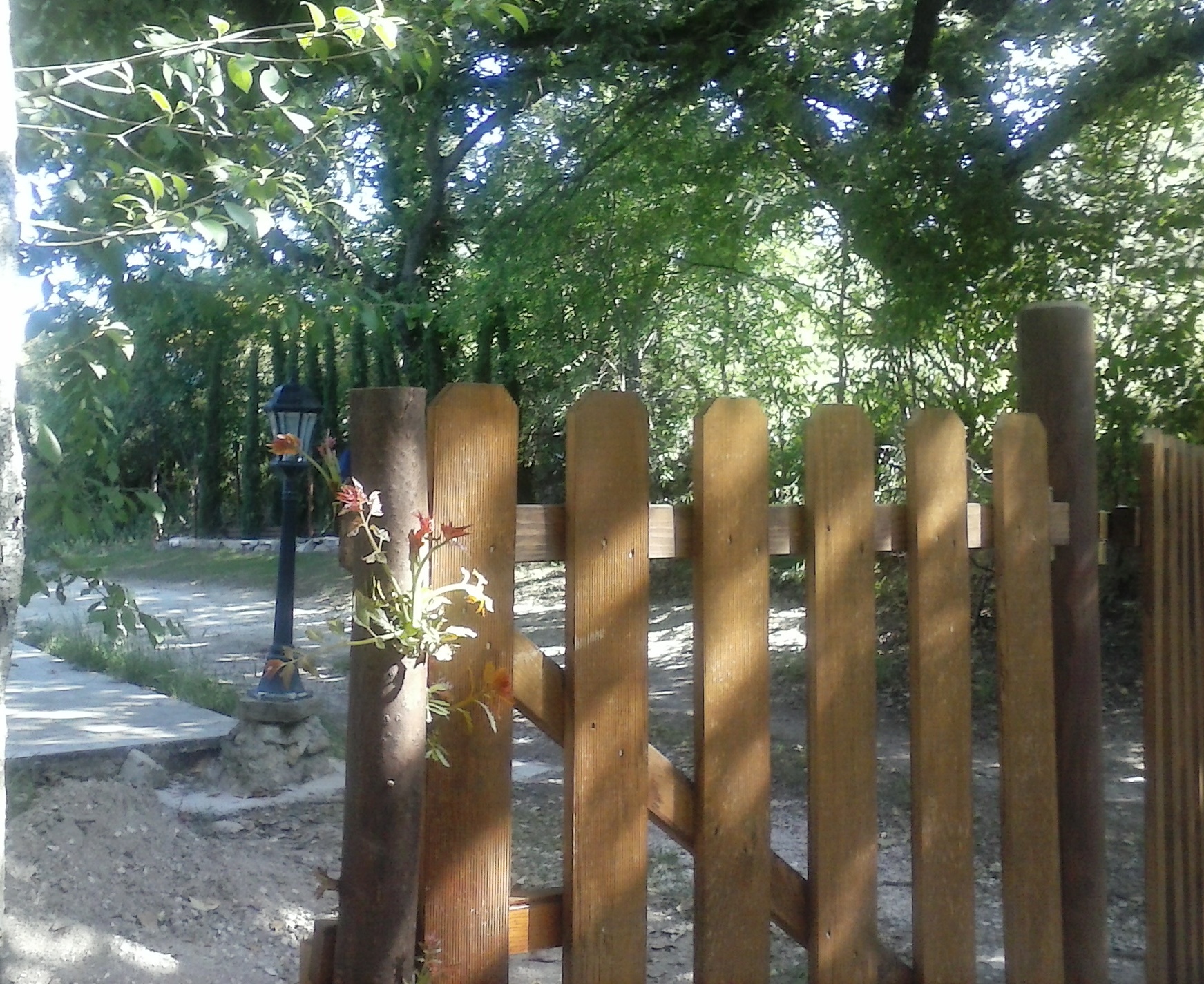
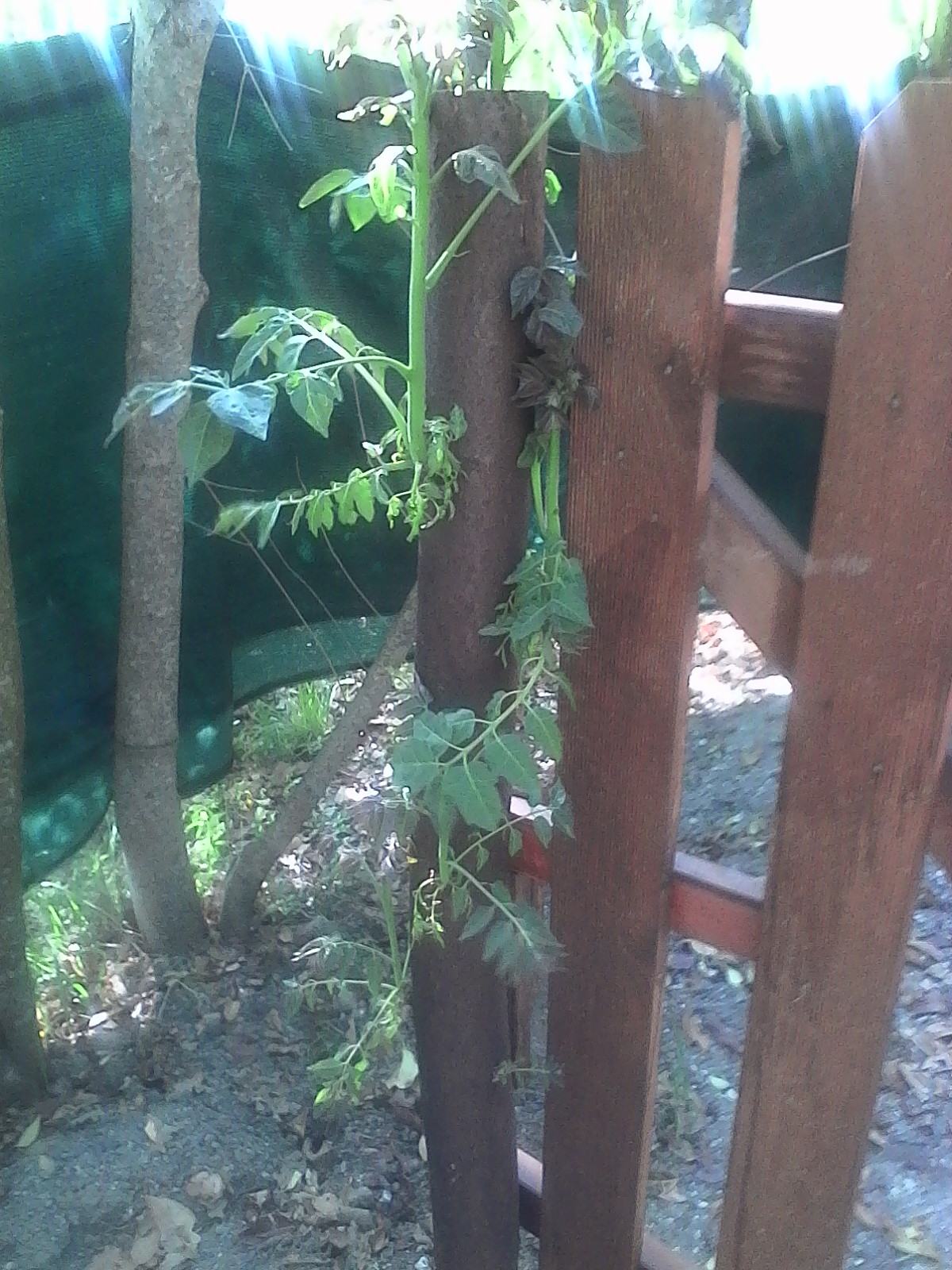
Mai sentito dire di
un cancello che... germoglia! Eppure chi vuol stupirsene può vederlo a Rocca
Sant'Angelo di Assisi, nella sede della Comunità Famiglie di Betlemme.
Dove nel completare un cancello di legno, mancando ancora un paletto lo si è
ricavato da una delle tante piante di ailanto che decorano e d'estate
ombreggiano l'ingresso
della comunità. Il paletto, tagliato su misura e appuntito ad una delle
estremità, dopo essere stato trattato con un impegnante protettivo è stato
conficcato nel terreno a colpi
di mazza. Ma eccolo emettere dopo pochi giorni, a sorpresa , un vigoroso
germoglio. C'è da coglierne il messaggio: un messaggio profetico, tanto più
che il cancello
delimita il cortile dell'ex fienile riadattato ad abitazione dove abita da
tanti anni, ora anziano e malato, Marcello Ciai, il Profeta di Assisi.
In estremo oriente, da dove è originario, l'ailanto è conosciuto col nome di
"albero del Paradiso"; da noi coll'ugualmente suggestivo nome di "toccacielo".
Nelle Sacre Scritture Gesù è profetizzato come il Germoglio giusto "che
regnerà da vero re e sarà saggio ed eserciterà il diritto e la giustizia
sulla terra"
(Geremia 23:5) E nel profeta Isaia (43:19) il Signore dice: "Ecco, faccio
una cosa nuova: proprio ora germoglia, non ve ne accorgete?
Aprirò anche nel deserto una strada, immetterò fiumi nella steppa".
E alla fine della profezia sul terremoto di Assisi del 1997, avuta due anni
prima da Marcello Ciai (Ascolta, Assisi! 1995), si leggono queste
confortanti parole
di una salvezza cosmica sempre più vicina, perché si avvicina il ritorno di
Gesù su questa terra; allora "il deserto si trasformerà poi e dunque in
giardino.
In un libro finalmente leggeranno. L'umiltà udrà, la giustizia vedrà. Il
beffardo e il buontempone spariranno e nessuno potrà più per un nulla
rovinare l'altro.
I messaggeri di pace non si strozzeranno e gli araldi li accoglieranno. Il
giardino si trasformerà in parco e il libro in dottrina.
Lo Spirito del Signore abbraccerà la terra e i morti allora si ameranno".
Never heard of a gate that ... sprouts! Yet
those who want to be amazed can see it at Rocca Sant'Angelo, Assisi, in the
seat of the community Bethlehem’s Families.
There, while completing a wooden gate, a missing pole was obtained from one
of the many plants of ailanto that decorate and in the summer shadow the
entrance
of the community. The pole, cut to size and pointed at one end, after having
been treated with an impregnating paint, was stuck in the ground at poker
strokes.
But here it is, after a few days, to emit a vigorous sprout. There is a
message to grasp: a prophetic message, all the more especially as the gate
delimits the courtyard
of the former hay barn restructured into habitation where Marcello Ciai, the
Prophet of Assisi, now elderly and ill, lives since so many years.
In the Far east, from where it originates, the ailanto is known as the "Tree
of Paradise"; in Italy it is designed by the equally suggestive name of
"Touch the heaven"
(toccacielo). In the Sacred Scriptures Jesus is prophesied as the
righteous sprout who "shall reign as king and deal wisely, and shall
execute justice and righteousness
in the land”.(Jeremiah 23: 5). And in the prophet Isaiah (43:19) the
Lord says: " Behold, I am about to do a new thing: right now it sprouts,
do not you perceive it?
I will also open a road in the desert, I'll make rivers in the steppe."
And at the end of the prophecy on Assisi's earthquake of 1997, received two
years before by Marcello Ciai (“Listen, Assisi!”, 1995), these comforting
words are written,
concerning a cosmic salvation getting closer and closer, as Jesus’ return on
this earth is approaching; then "the desert shall be transformed then and
thence in garden.
In a book finally they will read. Humility will listen, justice will see.
The mocker and the jolly fellow will disappear and nobody will be able
anymore to ruin the
other for nothing. The messengers of peace will not choke themselves and the
heralds will welcome them. The garden shall be transformed into a park
and the book into doctrine. The Spirit of the Lord will embrace the earth
and the dead then will love one another”.
* * * * * * * * * * * * * *
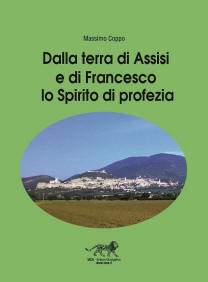
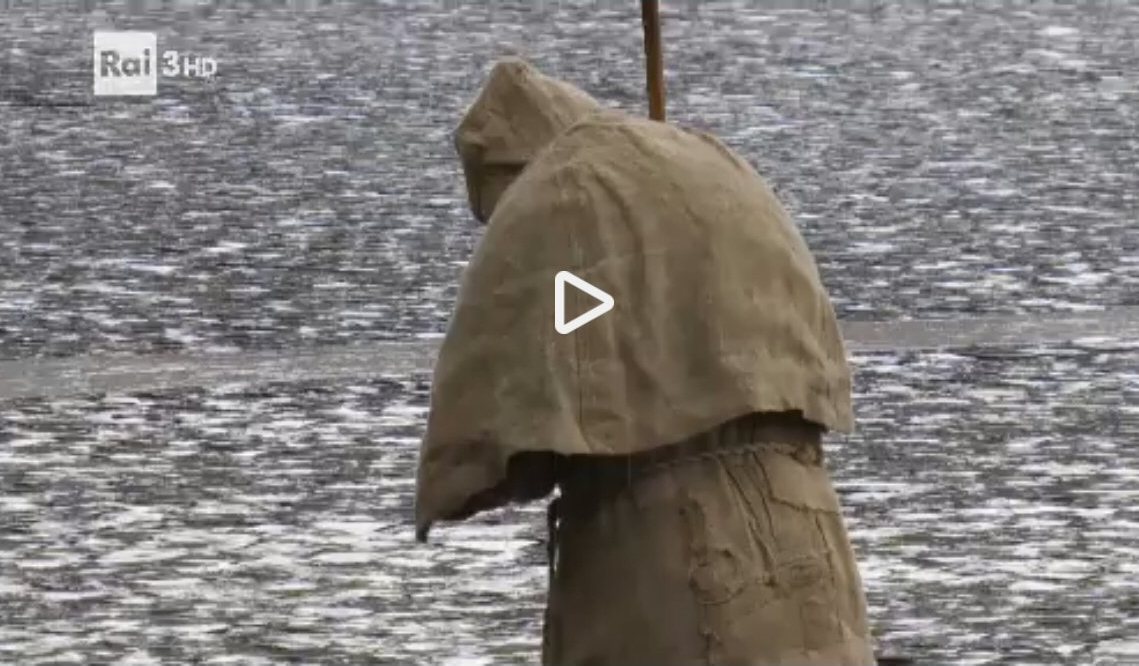
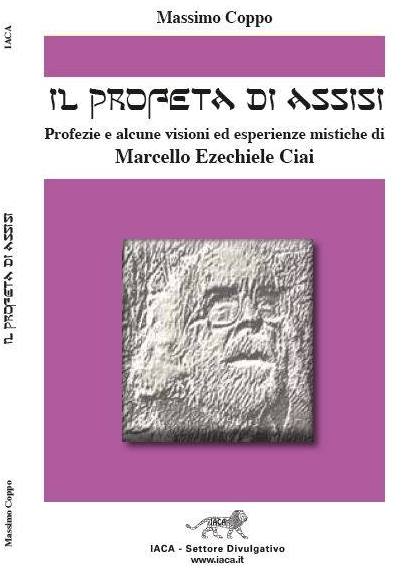
Vedi la sezione del documentario da 1.02.35 a
1.09.08
See the section of the documentary from 1.02.35 to 1.09.08
La
preghiera del penitente col sacco e a piedi nudi sotto la pioggia a Piazza
San Pietro durante l'ultimo Conclave - una preghiera che ha "ottenuto" Papa
Francesco - continua ad essere
riproposta con crescente interesse su vari servizi televisivi: ultimo il film
documentario "Un selfie con il Papa" trasmesso da Rai 3 agli inizi del 2017.
Nel commentare l'episodio,
la giornalista vaticanista Franca Giansoldati dice che quel
misterioso personaggio si è poi improvvisamente volatilizzato, e non si è
mai più visto. Ma quell'alone di mistero è svelato
nel libro "Dalla terra di
Assisi e di Francesco
lo Spirito di profezia" scritto proprio da quel “penitente”, Massimo Coppo -
e in costante aggiornamento - sull'opera profetica di cui fa parte
da 36
anni ad Assisi, sotto la guida spirituale di Marcello Ciai.
In un capitolo intitolato "Segno profetico al Vaticano, un pellegrino di
Assisi", l'autore scrive: "Il pellegrino che è stato tutto
il tempo in
ginocchio su una chiavica di Piazza San Pietro, a pregare per un
Papa umile e vicino ai poveri come San Francesco, ero proprio io. Ma per
amore di verità, e anche per
smitizzare l'incredibile notorietà che poi mi è
cascata addosso - a Roma circola addirittura un santino
con l'immagine non di un santo, ma di me che santo non sono mentre prego
sotto
un forte acquazzone - va subito detto che l'iniziativa di andare lì
non era stata mia, ma di Marcello Ciai: questo profeta
umbro affascinato e innamorato di quel Gesù che gli è apparso
e gli ha
parlato tanti anni fa, con le sue profezie ed eccezionali visioni,
fu ispirato dal Signore a farmi andare a sostenere con un umile ma
accorata preghiera la Chiesa
in un frangente così delicato".
The prayer of the penitent with a
sackcloth and barefoot under the rain in St. Peter's Square during the last
Conclave - a prayer that has "obtained" Papa Francesco - continues
to be
revived with growing interest on various television services: the latest was a
documentary film entitled "A selfie with the Pope" broadcast by the Italian
network RAI
Commenting that
episode, the
revealed in
the book "From the land
of Assisi and of Francis the Spirit of prophecy" written just by that
“penitent”, Massimo Coppo - and constantly updated - on the prophetic work
to
which he belongs since 36 years
in Assisi, under the spiritual guidance of Marcello Ciai. In a chapter
entitled "A prophetic sign at the Vatican“ the author writes: "It was me
the pilgrim
who stood all the time kneeling on a sewer at
Saint Peter's Square, to pray for a Pope humble and close to the poor like
St. Francis. But for the love of truth, and also to debunk the
incredible
notoriety that then felt upon me - in Rome they even pass around a small “holy picture” with the image not of a saint, but of me
- and I'm not a saint, while praying under
a heavy downpour. I must make it
clear immediately that the initiative to go there
to pray was not mine, but of Marcello, this
Umbrian prophet fascinated and fond of that Jesus
who appeared and spoke
to him many years ago, with his prophecies and extraordinary visions,
who was inspired by the Lord to send me to support with a humble but
heartfelt
prayer the Church in a so delicate moment".
* * * * * * * * * * * * * *
E' uscita la nuova edizione de "Il Profeta di Assisi" a cura dell'Associazione IACA.
Nel libro sono raccolte
le profezie avute da questo vero profeta umbro
- Marcello Ezechiele Ciai, ora ottantenne - e alcune sue meravigliose
visioni ed esperienze mistiche.
* * * * * * * * * * * * * *

E' uscita la nuova edizione del libro "Dalla terra
di Assisi e di Francesco lo Spirito di Profezia", scritto da Massimo
Coppo e
edito dall'Associazione IACA. Un libro in costante aggiornamento,
perché documenta una singolarissima e incredibile
opera profetica nella terra di San Francesco,
iniziata 50 anni fa e tutt'ora in corso.
Tra
i tanti commenti di apprezzamento sul libro: "ho letto il libro in un
attimo" ha scritto una signora del Brasile
"il mio cuore piangeva e rideva allo stesso tempo". E un altro
lettore: "Grazie di cuore, con il vostro libro ho ritrovato nel mio
cuore la fede verso Dio".
The new edition of the book "From the land of Assisi and Francis the
Spirit of Prophecy," written by Massimo Coppo
and
published by the Association IACA has come out. A book constantly
updated, because it documents a singular and amazing
prophetic work in the land of St.Francis, which began 50 years ago and
is still ongoing.
Among the many comments of appreciation about the book, a woman from
Brazil has written: "I read the book in an instant, my heart was
crying
and laughing at the same time". And another reader: "Thank you
very much, with your book I have found again in my heart the faith
towards God".
* * * * * * * * * * * * * *
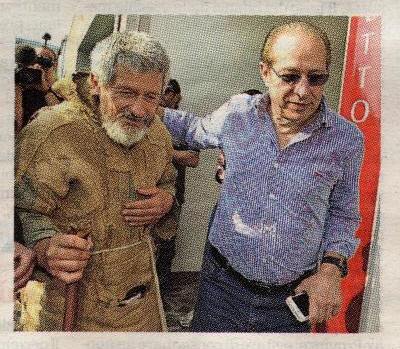
16 Giugno 2016 -
Ci rallegriamo insieme al fratello di Berlusconi che grazie a Dio
tutto è andato bene,
e che oggi Silvio è uscito dalla terapia intensiva.
June 16, 2016 - We rejoice with the brother of Berlusconi that thanks to
God everything has gone well,
and today Silvio has come out of the intensive therapy.
***************
Berlusconi ha detto: "Mi affido a Dio"
Dio risponde tramite il Profeta
di Assisi (Marcello
Ezechiele Ciai): "Vendi tutto e dallo ai poveri!"
Il messaggio è stato affidato al fratello Paolo
Berlusconi said: "I entrust myself to God"
God answers through the Prophet
of Assisi (Marcello
Ezechiele Ciai): "Sell everything and give it to the poor!"
The message has been entrusted to his brother Paolo

(Foto: La
Repubblica - 12 giugno 2016)
(Photo: La Repubblica - june 12th 2016)
***************
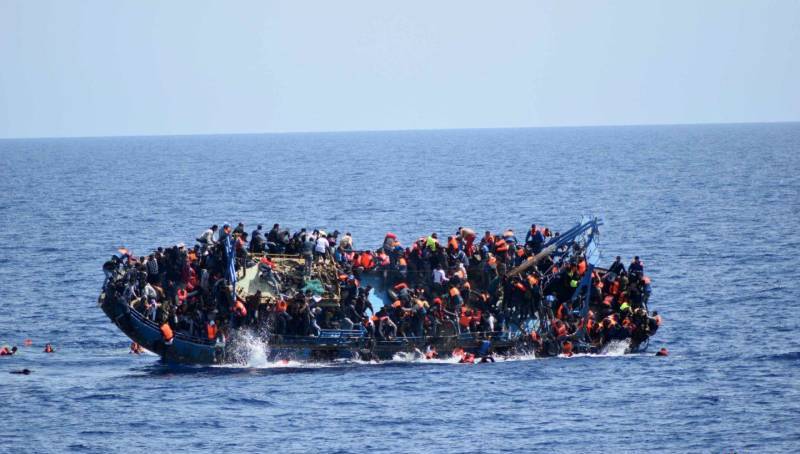
Migranti,
catastrofe umanitaria senza fine nelle acque del Mediterraneo. Ma per
trovare la ragione ultima di tanti lutti e tragedie
che funestano questo nostro tempo, dobbiamo tornare a
una
lettura “profetica” di ciò che sta succedendo,
alla luce della Parola eterna di Dio e di autentiche profezie…
Migrants,
humanitarian disaster without end in the Mediterranean Sea. But to find the
ultimate reason of so many deaths and tragedies
that afflict our time, we must go back to a “prophetic” reading of what is
happening,
in the light of the eternal Word of God and of authentic prophecies...
**********************
We publish this
article and video from the “Fatto Quotidiano”, interesting for us on our
Massimo Coppo of Assisi
Gay unions, the
preacher arrives at the House of Representatives: "He
plus he is not civil,
children do not learn the word mother"
In Montecitorio Square also he arrives, the barefoot preacher dressed as a
Franciscan who comes out against civil unions for final approval in the
House.
"He plus He is not civil, the next step is the adoption and there will be
children who will never learn the word mother" he shouts.
At the end he is removed through the intervention of the police for the
happiness of LGBT (initialism gay) protesters.
By Irene Buscemi
Sta suscitando un grande interesse questa foto pubblicata sulla pagina ufficiale Facebook di Padre Gabriele Amorth, il notissimo Esorcista. La foto ripropone Massimo Coppo inginocchiato in preghiera a Piazza San Pietro durante l'ultimo Conclave, sotto una pioggia torrenziale. Molto significativa è la dicitura che compare sulla foto. In effetti in un mondo che, come è scritto nella Bibbia, sta in potere del maligno -"il padre della menzogna", così lo ha definito Gesù - la Verità del Vangelo comporta della sofferenza per quanti la professano coraggiosamente.
Fu Marcello Ciai - il Profeta di Assisi - che mandò Massimo a San Pietro per quella preghiera veramente "profetica" che anticipò il primo Papa della storia di nome Francesco. Nella prima delle sue profezie ("Il Mantello", 1981) così il Signore rimprovera quei religiosi che distorcono il Vangelo per non crearsi inimicizie: "Guai a voi preti e frati che pascete voi stessi... non tagliate rettamente e fermamente la mia parola. Dite che c'è pace dove pace non c'è, dite che c'è giustizia dove giustizia non c'è; dite che c'è amore dove amore non c'è; dite che c'è perdono dove perdono non c'è!"
This
photo published on Facebook in the official page of Father Gabriele
Amorth, the well-known exorcist, is arousing great interest. The photo
reproposes Massimo Coppo kneeling in prayer in St. Peter's Square during
the Conclave, under a torrential rain. Very significant is the wording
that appears on the photo: "In a world where lie is strong, truth is
paid with sufferance". In fact, in a world which is, as it is
written in the Bible, in the power of the evil one -
"the father of lies", as Jesus Christ called him - the Truth of the
Gospel involves sufferance for those who profess it courageously.
It was Marcello Ciai - the Prophet of Assisi - who sent Massimo to Saint
Peter for that truly "prophetic" prayer that anticipated the first Pope
in history named Francis. In the first of Marcello's prophecies ("The
Cloak", 1981) the Lord rebukes those religious who distort the Gospel in
order to avoid enmities: "Woe to you
priests and friars who herd yourselves ... you don't treat correctly and
firmly my word. You say that there is peace, where peace doesn't exist,
you say that there is justice where justice doesn't exist, you say that
there is love where love doesn't exist, you say that there is
forgiveness
where forgiveness doesn't exist!"
Nell'anno giubilare della misericordia
in Assisi tra le tante chiese, conventi e monasteri si trova un particolare
luogo laico di preghiera
a cui tutti i turisti e pellegrini di qualsiasi estrazione religiosa possono
affidare le proprie intenzioni di preghiera.
Si trova proprio al centro di Assisi, si chiama "Eco Sacro" e sta suscitando
un grande interesse.
In the jubilee year of mercy in Assisi among the many
churches, convents and monasteries there is a particular laic place of
prayer
to which all tourists and pilgrims of all religious backgrounds can entrust
their prayer intentions.
It is located right in the center of Assisi, it is called "Sacred Echo" and
it is arousing great interest.
Terrorismo,
migranti, scandali, corruzione dilagante, tragedie quotidiane... più o meno
consapevolmente tanti si chiedono come un Dio, "Padre Onnipotente" - il cui
nome è "Misericordia" come ha scritto il papa - lasci questa terra da Lui
creata in balia di tanto male, tante sofferenze, tante ingiustizie. Solo la
profezia, la vera profezia, può dare la risposta ultima a questo "perché",
che se non trova risposta allontana tanti dalla fede. Ed è per questo che,
come è scritto, ”Dio ha posto alcuni nella Chiesa come profeti” (I Lettera
ai Corinzi 12,28).
E in Assisi, città santuario del mondo, oltre a quel Santo veramente unico
che è San Francesco, il Signore da una quarantina d'anni ha suscitato un
vero profeta, Marcello Ezechiele Ciai, con tutte le credenziali del vero
profeta: disprezzato nella sua Assisi, disconosciuto dai suoi, emarginato
insieme alla sua comunità dal 1994 al 2006 con bolla di eresia (ma “un
profeta non è disprezzato che nella sua patria, tra i suoi parenti e in casa
sua” avverte Gesù nel Vangelo). Eppure in tempi di penitenza e malattie
estreme quest’uomo ha ricevuto autentiche profezie che si stanno verificando
in modo impressionante: "Oh vedo una carovana di profughi in lutto; malati,
feriti, impiccati...” scriveva nel 1995 nella profezia sul crollo
dell’economia mondiale, “portate acqua! portate pane ai fuggiaschi! Perché
non languiscano e muoiano."
Nelle sue profezie si può trovare la risposta di Dio al nostro "perché". Un
Dio che è immensamente misericordioso, ma di una misericordia intessuta di
giustizia infinita e di santa ira su un mondo che - anche laddove è
ammantato di falsa religiosità - volge le spalle al suo Creatore: "Odi, oh
terra, dov'è la tua salvezza? A Papeete o nel Papa forse?!" si legge nella
seconda profezia su Roma di questo profeta assisano (Alla Città Gaudente,
1995) "Io, faccio piovere secondo le stagioni, Io, ho creato la semina e la
vendemmia; ma voi siete solo capaci di ubriacarvi delle vostre idee. I
vostri iniqui pensieri hanno sconvolto tutte le cose belle da me, per voi
create. Ed è per questo che sventura e terrore arriveranno su di voi ….”
Terrorism, migrants, scandals, rampant
corruption, daily tragedies ... more or less consciously many are asking
themselves how a God, " Almighty Father " - whose name is "Mercy" as the
Pope wrote- lets this earth, created by Him, at the mercy of so much evil,
so much suffering, so much injustice. Only the prophecy, the true prophecy,
can give the ultimate answer to this "why", that if it doesn’t find any
response, may lead many away from faith. And that's why, as it is written,
“God has placed in the Church some as prophets” (I Corinthians 12:28).
In Assisi, sanctuary city of the world, besides that truly unique Saint who
is Saint Francis, the Lord forty years ago has raised a true prophet,
Marcello Ezekiel Ciai, with all the credentials of a true prophet: despised
in his Assisi , disowned by his relatives, marginalized together with his
community from 1994 to 2006 with a bull of heresy (but "prophets are not
without honour except in their own country, and in their own house," Jesus
warns in the Gospel). Yet in times of penance and extreme diseases this man
received authentic prophecies that are coming true in an impressive way: "Oh
I see a caravan of refugees in mourning, sick, injured, hanged ..." he wrote
in 1995 in the prophecy on the collapse of world economy "bring water! bring
bread to the refugees! So that they don’t languish and die."
In his prophecies you can find God's answer to our "why". A God who is
infinitely merciful, but of a mercy also interwoven with infinite justice
and holy wrath on a world that - even if wrapped in a false religiosity -
turns his back on his Creator: "Listen, oh earth, where is your salvation?
At Papeete or in the Pope perhaps? " one reads in the second prophecy on
Rome of this prophet of Assisi (To the Pleasure Seeking City, 1995) "I make
it rain according to the seasons, I have created the sowing and grape
harvest; but you are only able to get drunk on your own ideas. Your wicked
thoughts have ruined all the beautiful things created by me, for you.
Therefore misfortune and terror will come upon you ..."
Ad Assisi, a Rocca Sant'Angelo, è stata recentemente inaugurata la “ Chiesetta sulla Quercia Sacra”.
In Assisi, at Rocca Sant'Angelo, recently the "Church on the Sacred Oak", has been inaugurated.
![]()
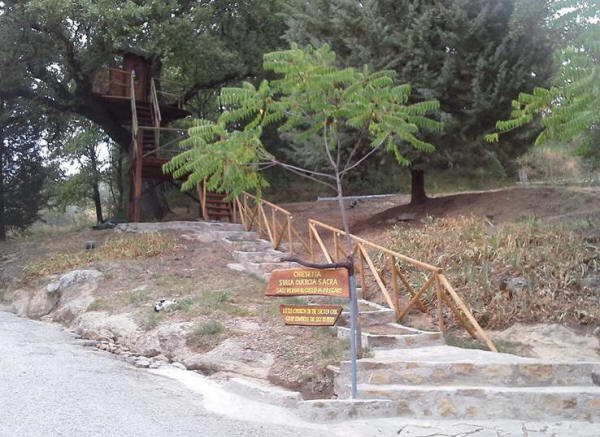
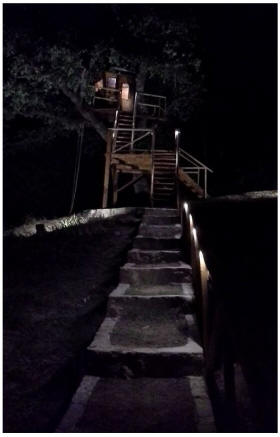
Un
sorprendente e vero capolavoro di “arte sacra”,
noi crediamo unico al mondo, è stato
ultimato a poca distanza da Assisi - Rocca Sant’Angelo - presso la sede
dell'Associazione Iaca: una chiesetta, incastonata tra le possenti branche
di una quercia plurisecolare, realizzata senza nemmeno piantarvi un chiodo,
cui si accede salendo dapprima per dei gradoni inerbiti, e poi per una
scalinata di legno (la “scala di Giacobbe”) intramezzata da una piattaforma,
pure lignea, che funge da “sacrato”.
Questa “Chiesetta sulla Quercia Sacra”, concepita come un sogno da Marcello
Ezechiele Ciai, il fondatore della Associazione e della comunità che vi è
assistita, è stata realizzata dalla maestria creativa di un suo amico e
collaboratore.
Un luogo di estremo misticismo, per salire verso il cielo e innalzare
l’anima a Dio: un vero santuario degno della verde e mistica Umbria, della
terra di San Francesco, e ancor di più della grandezza di Dio. Diffondi
questa bella notizia più che puoi, ne riceverai tu stesso una benedizione!
A
surprising and
true masterpiece
of "sacred art",
as we believe
unique in the world, has been
completed not far from
Assisi - Rocca Sant'Angelo
- at the seat of IACA
Association: a little
church, set among the
mighty branches of
a centuries-old
oak, made without planting on it
a single nail. One goes up there
first along large steps of stone and grass,
and then
climbing a wooden
staircase (the "Jacob's
Ladder") interrupted by
a platform, which functions as a
"parvis".
This "Little Church
on the Sacred
Oak", conceived as
a dream by Marcello
Ezekiel Ciai,
the founder of the Association
and of the community
there assisted, was realized by
the creative mastery of
his friend and collaborator.
A place of extreme
mysticism, to ascend towards the
sky and lift ones soul to
God: a true sanctuary
worthy of the green
and mystical
Umbria, of the
land of St. Francis,
and especially
of God's greatness.
Spread this
beautiful news as much as you can: you will receive a blessing!
![]()
|
Massimo Coppo predica da un luogo di ritiro e di preghiera |
Massimo Coppo
preaches from a place of retreat and prayer |
![]()
![]()

Museo paleontologico di Pietrafitta - Piegaro -- La collezione di resti fossili delle ligniti della Centrale di Pietrafitta, è divenuta la più importante raccolta attualmente conosciuta in Europa. Sono presenti una grande varietà di specie rarissime.
Paleontological Museum of Pietrafitta - Piegaro -- The collection of fossils of the Pietrafitta Plant's lignite, has become the most important collection currently known in Europe. There are present a wide variety of rare species.
Museo paleontologico
di
Pietrafitta (Piegaro).
Un museo unico in Europa, con una superficie complessiva di
circa 3000
metri quadrati.
Paleontological
Museum of
Pietrafitta (Piegaro).
A unique Museum in Europe, with a total area of about 3000 square metres.
![]()
![]()
|
|
LA CONFERENZA MONDIALE DELL'ONU DICHIARA:
Catastrofi raddoppiate in 10 anni
'Nessun Paese è al sicuro'
THE WORLD CONFERENCE OF THE UNO DECLARES:
Catastrophes have been redoubled in 10 years
'No nation is safe'
_______________
 ^>^<^>^>Terremoto
^>^<^>^>Terremoto
Earthquake ^>^<^>^>
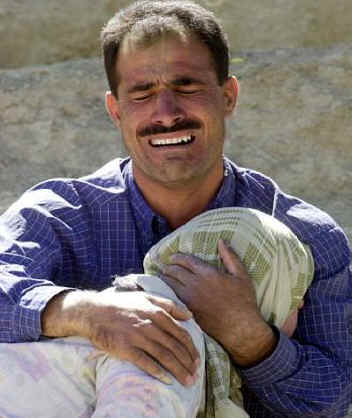
Pianto di lutto e disperazione per il terremoto
A cry of mourning and despair for the earthquake
Terremoti in varie parti del mondo, morti e feriti....Earthquakes in various parts of the world, victims and injured....
![]()

_____
SOUTH PADRE ISLAND, Texas
Victims
and people missing,
ravage and evacuations,
incalculable damages
due to floods
all over the world
![]()
 MAMMA
ACQUA MUORE
MAMMA
ACQUA MUORE
MUMMY
WATER DIES
Milioni di persone,con anziani e bambini,muoiono ogni giorno per siccità,mancanza di acqua e acque inquinate!
Millions of people,with old ones and children,are dying each day for drought, water lack and water-pollution!

L'acqua uccide più delle guerre. La
denuncia arriva dal segretario dell'ONU Kofi Annan.
Non si vede rimedio ed è troppo tardi per evitare una
silenziosa quanto ineluttabile catastrofe.
Water kills more than wars. The
declaration comes from the UNO-secretary Kofi Annan.
There is no way-out and it is too late to avoid a silent as well as an
inevitable catastrophe.
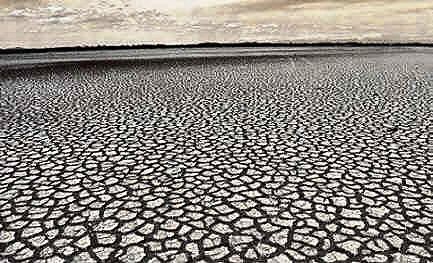
Apocalisse 8
[6]I sette angeli
che avevano le sette trombe si accinsero a suonarle.
[7]Appena il primo suonò la tromba, grandine e fuoco mescolati a sangue
scrosciarono sulla terra. Un terzo della terra fu arso, un terzo degli alberi
andò bruciato e ogni erba verde
si seccò.
Revelation 8
6 And the seven
angels which had the seven trumpets prepared themselves to sound.
7 The first angel sounded, and there followed hail and fire mingled with blood,
and they were cast upon the earth: and the third part of trees was burnt up,
and
all green grass was burnt up.
______________________________
|
Fa conoscere questo sito ad un amico!
Let this site know to a friend !

" OPERE " CHE NON SI TROVANO IN INTERNET
Interessanti, attuali eventi mondiali
"
WORKS " WHICH YOU DON'T FIND IN INTERNET
Interesting, current world events
Per quanto non trovato in questa pagina cercare su Google in www.ciai-s.net

Search www.ciai-s.net |